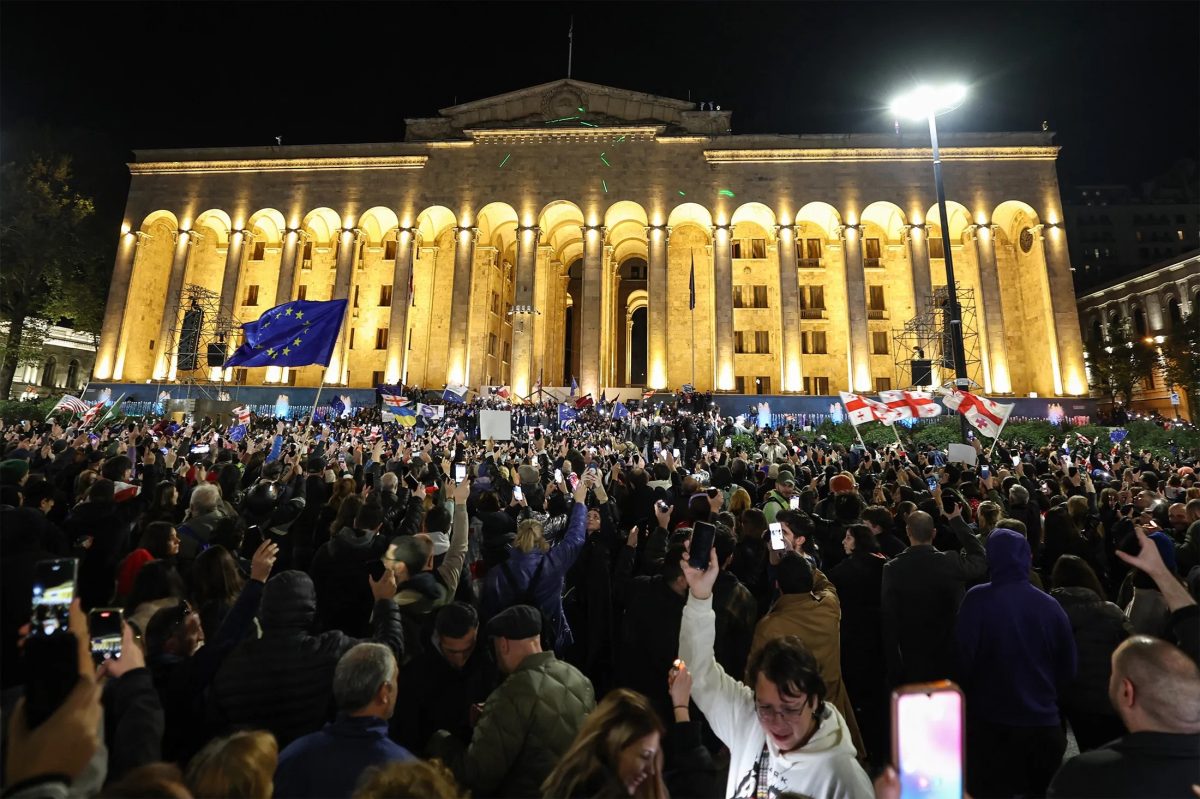TBILISI, (Reuters) – Thousands of people protested outside Georgia’s parliament today after the governing party won an election marred by reports of voting irregularities which Western powers said must be investigated.
Some protesters carried anti-Russia banners after a parliamentary election they had cast as choice between the Georgian Dream party, which has deepened ties with Russia, and an opposition seeking to fast-track integration with Europe.
The word “stolen” was projected onto the front of Soviet-era parliament building in Tbilisi, the South Caucasus country’s capital, but there were no signs of clashes as police looked on.
Georgian Dream, which came to power in 2012, won nearly 54% of the vote in Saturday’s election, the election commission said.
The four main opposition parties that won seats in parliament said they did not recognise the results, and that they would boycott the chamber.
President Salome Zourabichvili had urged people to take to the streets after the results were announced.
“You did not lose the elections. Your vote was stolen, and they tried to steal your future as well,” Zourabichvili told the crowd, draped in the flags of Georgia and the European Union.
“Together, peacefully, as we are today, we will defend what is ours: your constitutional right to have your vote respected.”
Monitors from the Organization for Security and Co-operation in Europe said they registered incidents of vote-buying, voter intimidation and ballot-stuffing that could have affected the outcome, but stopped short of saying the election was rigged.
Ana Korkia, a 28-year-old Tbilisi resident, said she had protested to “show European leaders that we are here and this election (result) is not our choice.”
The election result poses a challenge to the European Union’s ambition to expand by bringing in more former Soviet states.
NATO and the European Union called for a full investigation of what the Western military alliance called the “uneven playing field” in the election.
U.S. Secretary of State Antony Blinken had earlier appealed to Georgia to “respect the rule of law, repeal legislation that undermines fundamental freedoms, and address deficiencies in the electoral process together.”
‘CONSTITUTIONAL ORDER’ CHALLENGED
Zourabichvili, whose powers are mainly ceremonial in the former Soviet republic that declared independence of Moscow in 1991, has called the result a “Russian special operation”.
She told Reuters in an interview that she believed “the methodology used and the support of most probably Russian FSB (Federal Security Service) types is shown in this election.”
Russia rejected the allegations of election interference. The FSB, the main successor to the Soviet-era KGB, was unavailable for comment.
Kremlin spokesman Dmitry Peskov said the election result was “the choice of the Georgian people” and accused the West of trying to destabilise the situation.
Georgia was long one of the most pro-Western countries to emerge from the Soviet Union, with polls showing many Georgians disliking Russia for its support of two breakaway Georgian regions. Russia defeated Georgia in a brief war over the rebel province of South Ossetia in 2008.
Prime Minister Irakli Kobakhidze accused the opposition of attempting to “shake the constitutional order”, local media reported. He said his government remained committed to European integration.
Official results showed Georgian Dream won 54% of the vote, or 1.12 million votes – 335,000 votes more than the combined four main opposition parties, which are deeply divided.
The party won huge margins of up to 90% in some rural areas, but underperformed in Tbilisi and other large cities.
Bidzina Ivanishvili, the founder of Georgian Dream who is widely seen as the most powerful person in the country of 3.7 million, praised the Georgian people for their choice. The election commission said the vote was free and fair.






